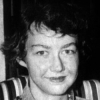Flannery O'Connor

Flannery O'Connor
Mary Flannery O'Connorwas an American writer and essayist. An important voice in American literature, she wrote two novels and 32 short stories, as well as a number of reviews and commentaries. She was a Southern writer who often wrote in a Southern Gothic style and relied heavily on regional settings and grotesque characters. Her writing also reflected her own Roman Catholic faith and frequently examined questions of morality and ethics. Her posthumously-compiled Complete Stories won the 1972 U.S. National Book...
NationalityAmerican
ProfessionNovelist
Date of Birth25 March 1925
CitySavannah, GA
CountryUnited States of America
Go warn the children of God of the terrible speed of mercy,
I was a very ancient twelve; my views at that age would have done credit to a Civil War veteran. I am much younger now than I was at twelve or anyway, less burdened. The weight of the centuries lies on children, I'm sure of it.
Children know by instinct that hell is an absence of love, and they can pick out theirs without missing.
I will rejoice the day when they say: This is right whether we all rot on top of each other or not, dear children, as we certainly may. Either practice restraint or be prepared for crowding...
Ours is the first age in history which has asked the child what he would tolerate learning.
The Church's stand on birth control is the most absolutely spiritual of all her stands and with all of us being materialists at heart, there is little wonder that it causes unease. I wish various fathers would quit trying to defend it by saying that the world can support 40 billion. I will rejoice the day when they say: This is right whether we all rot on top of each other or not, dear children, as we certainly may. Either practice restraint or be prepared for crowding...
Even a child with normal feet was in love with the world after he had got a new pair of shoes.
The two worst sins of bad taste in fiction are pornography and sentimentality. One is too much sex and the other too much sentiment.
Even in the life of a Christian, faith rises and falls like the tides of an invisible sea. It's there, even when he can't see it or feel it, if he wants it to be there. You realize, I think, that it is more valuable, more mysterious, altogether more immense than anything you can learn or decide upon It will keep you free - not free to do anything you please, but free to be formed by something larger than your own intellect or the intellects around you.
I feel that discussing story-writing in terms of plot, character, and theme is like trying to describe the expression on a face by saying where the eyes, nose, and mouth are.
It is popular to believe that in order to see clearly one must believe nothing. This may work well enough if you are observing cells under a microscope. It will not work if you are writing fiction. For the fiction writer, to believe nothing is to see nothing.
There is a question whether faith can or is supposed to be emotionally satisfying. I must say that the thought of everyone lolling about in an emotionally satisfying faith is repugnant to me. I believe that we are ultimately directed Godward but that this journey is often impeded by emotion
Either practice restraint or be prepared for crowding
There won't be any biographies of me because, for only one reason, lives spent between the house and the chicken yard do not make exciting copy.